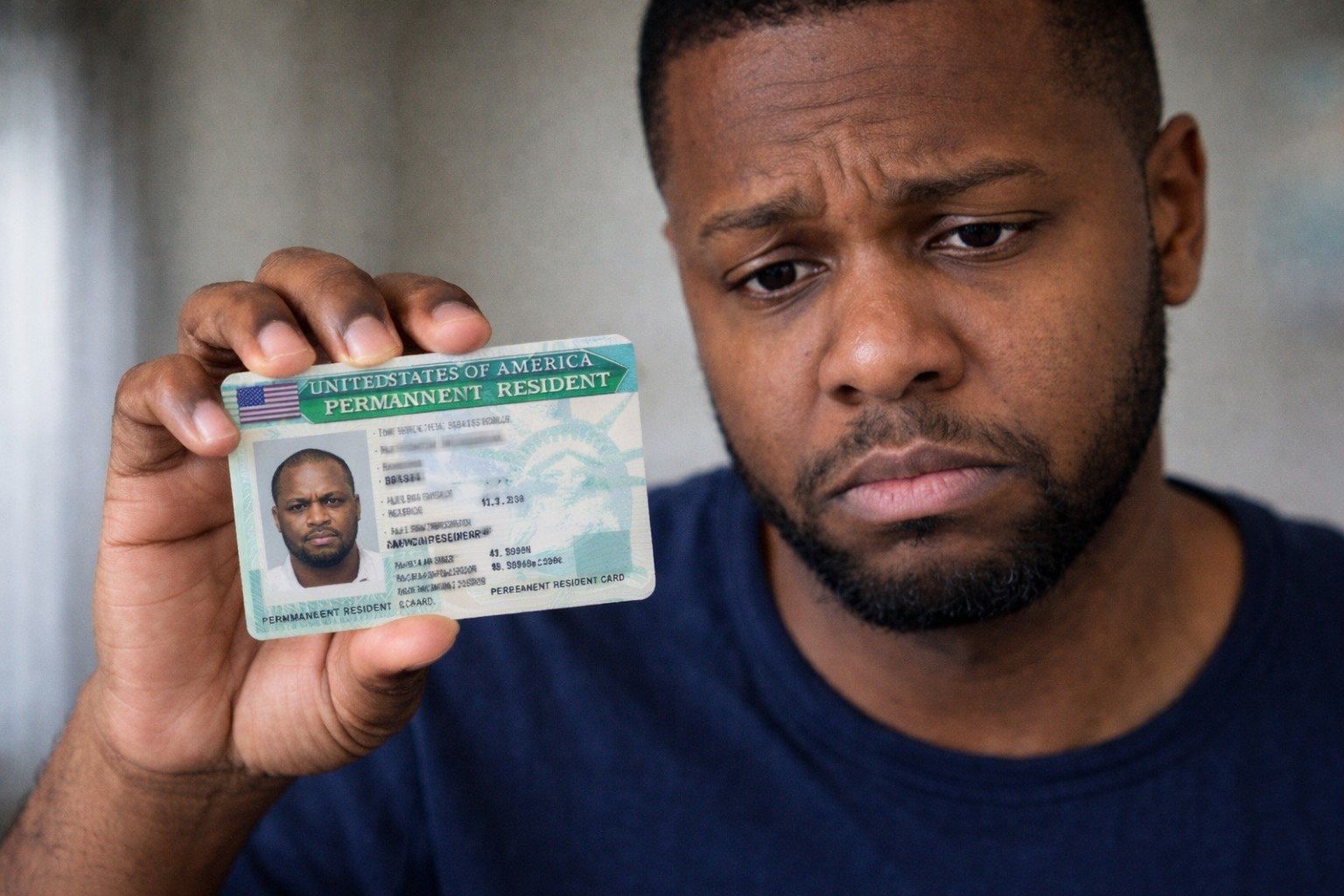
What Can Cause Loss of Permanent Residency in Texas
Becoming a lawful permanent resident is a major step toward building a stable life in the United States. Many people believe that once they receive a green card, their status is secure. In reality, permanent residency can be lost under certain circumstances, even if you live in Texas and have held your green card for years.
Understanding what can put your permanent resident status at risk is critical. Knowing when to seek legal help can make a significant difference.
What Is Permanent Residency?
Permanent residency allows a non-citizen to live and work in the United States indefinitely. Green card holders have many rights, but they must also follow specific rules under U.S. immigration law. Violating these rules can lead to loss of status and, in some cases, deportation.
Common Reasons Permanent Residency Can Be Lost
Several actions or situations can cause a green card holder to lose lawful permanent resident status.
1. Committing Certain Crimes
Some criminal offenses can make a permanent resident removable. These include aggravated felonies, drug crimes, crimes involving fraud, domestic violence, and crimes of moral turpitude. Even a conviction years after receiving a green card can trigger removal proceedings.
In many cases, the outcome depends on the type of offense, the sentence imposed, and the timing of the conviction.
2. Immigration Fraud or Misrepresentation
If a green card was obtained through fraud, false information, or misrepresentation, permanent residency can be revoked. This includes false statements on immigration forms or during interviews.
Fraud does not have to be discovered immediately. Immigration authorities can review past applications years later.
3. Abandoning Permanent Resident Status
Permanent residents are expected to live primarily in the United States. Long trips abroad, especially trips lasting six months or more, can raise questions about abandonment. Living outside the U.S. for extended periods without a reentry permit is a common reason people lose their green cards.
Using a green card while clearly living in another country can lead to serious consequences at the border.
4. Failure to Update Address
Green card holders are required to notify U.S. Citizenship and Immigration Services of any address change within the required time frame. Failing to do so may not always lead to immediate loss of status, but it can cause serious legal problems and affect future immigration benefits.
5. Violating Conditions of Residency
Some green cards are conditional, such as those based on marriage or investment. If the conditions are not properly removed within the required time, permanent residency can be terminated.
Missing deadlines or filing incomplete paperwork is a common issue in these cases.
6. Security-Related Grounds
Involvement in terrorism, espionage, or activities considered a threat to national security can result in loss of permanent residency. These cases are taken very seriously and move quickly through the immigration system.
7. Voluntarily Giving Up Permanent Residency
Some individuals formally abandon their green card, often for tax or long-term relocation reasons. Once permanent residency is surrendered, returning to the U.S. as a resident becomes difficult.
What Happens If You Are at Risk of Losing Your Green Card?
If immigration authorities believe you are removable, you may be placed in removal proceedings before an immigration judge. This does not mean loss of status is automatic. Many people have defenses available, but timing and legal strategy are critical.
Ignoring notices or attempting to handle the process alone can make the situation worse.

How Mokolo Law Firm Can Help
Mokolo Law Firm provides legal guidance and representation for permanent residents facing immigration challenges in Texas. The firm can:
- Evaluate whether a criminal charge or conviction affects your green card
- Advise on travel risks and reentry issues
- Help prevent abandonment of permanent residency
- Assist with removal of conditions on residency
- Review past immigration filings for errors or misrepresentation risks
- Represent clients in removal and deportation proceedings
- Prepare waivers and legal defenses when available
- Advise permanent residents seeking U.S. citizenship
The firm focuses on protecting lawful status and helping clients make informed decisions before problems become irreversible.
Final Thoughts on What Can Cause Loss of Permanent Residency in Texas
Permanent residency offers important rights, but it also comes with legal responsibilities. Many green card holders lose their status because they were unaware of the risks or waited too long to seek help.
If you are concerned about your permanent resident status or facing immigration issues in Texas, early legal guidance is essential. Mokolo Law Firm works to protect your residency, your future, and your ability to remain in the United States legally.

Green Card Interview Process in Texas
If you’re applying for a Green Card and living in Texas, the interview stage is a crucial milestone in your immigration journey. Whether your application is based on marriage, family sponsorship, employment, or asylum, the Green Card interview is where USCIS officers assess the authenticity of your application, determine your eligibility for permanent residency, and evaluate the legitimacy and completeness of your case.
The process can feel intimidating, but with the right preparation, it doesn’t have to be. Understanding what to expect, what to bring, and how to present your case can make all the difference between a smooth approval and an unexpected delay.
In this guide, we’ll walk you through everything you need to know about attending your Green Card interview at a Texas USCIS field office, from important documents and interview questions to post-interview outcomes and expert tips for success.
Green Card Interview Process in Texas
Venue of Interview in Texas
The Green Card interview is a formal step conducted by U.S. Citizenship and Immigration Services (USCIS) to verify your eligibility for permanent residency. Depending on your case type and location, the interview typically takes place at a USCIS field office in Texas (e.g., Houston, Dallas), unless waived under limited criteria such as minor children or illness. Applicants abroad may be interviewed at a U.S. embassy or consulate.
For marriage-based Green Card applicants, the officer will also assess whether your relationship is authentic and legally valid, ensuring it was not entered into solely to gain immigration benefits. Both the applicant and the petitioner (e.g., spouse) must attend. Interpreters and attorneys may also accompany you if allowed.
Document Requirements
- Appointment notice (Form I-485)
- Government-issued photo ID (passport, driver’s license)
- Complete copy of your I-485 application with supporting documents
- Original civil documents (birth, marriage certificates)
- Form I-693 sealed medical exam packet (required since Dec 2024)
- Evidence of bona fide relationship (joint bank/lease statements, photos, etc.) for marriage cases
- Employment verification letter and job offer documents for employment-based cases

Interview Process
The primary goal of the interview is to confirm the accuracy of the information you submitted in your application and to evaluate your eligibility under current immigration law. During the session, a USCIS officer will:
- Review your submitted documentation
- Verify your identity using photo ID and biometrics
- Ask questions about your background, immigration history, and employment or family ties
Approaching this interview well-prepared can make a critical difference in the outcome of your case.
Common Green Card Interview Questions
The Green Card interview typically includes a mix of personal, professional, legal, and relationship-related questions to verify your eligibility and the authenticity of your application. Here’s how the questions are generally grouped:
Personal Background
- Identity details: full name, aliases, birthdate, nationality, and address history
- Family: marital status, children, parents, and siblings
- Contact information, occupation, and education history
Employment History
- Current and past jobs, employer details, salary, job duties, and unemployment gaps
- Self-employment, business ownership, certifications, and licenses
Legal History
- Past arrests, convictions, immigration violations, deportations, visa overstays, fraud, or false claims
- Tax compliance, lawsuits, and affiliations with criminal or terrorist organizations
- Willingness to take the U.S. Oath of Allegiance
Marriage-Based Questions (if applicable)
- How and when you met, relationship milestones, wedding and honeymoon details
- Daily routines, shared finances, household responsibilities, personal habits, and family knowledge
- Evidence of a bona fide marriage
Additional Lifestyle Questions
- Travel history, public benefits, financial plans, property ownership, and community involvement
- Motivation for U.S. residency, integration efforts, language skills, and long-term goals
These questions help USCIS assess your credibility, the validity of your relationship (if applicable), and your readiness for permanent residency in the U.S. Practicing clear, honest, and consistent answers is key to a successful interview.
After the Interview
- You might receive an approval with a temporary I‑551 stamp in your passport, and your Green Card will arrive in the mail
- Or receive a Request for Evidence (RFE), Notice of Intent to Deny (NOID), or additional review request
- In some cases, USCIS may call you for a second interview
Tips for a Successful Green Card Interview in Texas
Preparing thoroughly for your Green Card interview can make the difference between approval and delay. Here’s how to ensure you’re ready:
- Know Your Application Inside and Out
Review all the information you submitted in your application forms. Be ready to clearly explain your answers and provide context where necessary, especially for personal history, travel, or family relationships. - Bring All Required Documents
Come fully prepared with original documents and copies, including:- Passports, visas, and government-issued ID
- Marriage or birth certificates
- Employment verification letters or job records
- Financial documents, tax returns, and any prior immigration records
- Practice Interview Questions
Review common interview questions related to your case type: marriage-based, employment-based, or family sponsorship. Practicing with a friend, spouse, or attorney can help you become more confident and concise in your responses. - Communicate Honestly and Clearly
Always answer truthfully and avoid exaggeration. If a question is unclear, don’t hesitate to ask the officer for clarification. Clear, direct answers are best. - Dress for the Occasion
Appearances count. Dress in neat, professional clothing that reflects your respect for the process. Business casual or formal attire is appropriate. - Stay Calm and Focused
Nerves are normal, but try to remain composed. Take your time when responding and focus on answering one question at a time. - Consult an Immigration Attorney
Working with an experienced immigration attorney can significantly strengthen your case. At Mokolo Law Firm, we help clients:- Prepare for specific interview questions
- Organize and review all required documents
- Understand potential red flags in their application
- Attend the interview with legal representation if needed
Final Thoughts on Green Card Interview Process in Texas
The Green Card interview is a pivotal step toward achieving permanent residency in the United States. By preparing carefully and seeking legal guidance, you’ll be well-positioned for a successful outcome.
Schedule a Consultation with Mokolo Law Firm
Let Mokolo Law Firm guide you through every step, from document preparation to interview coaching and legal representation. Contact us today to schedule a personalized consultation and take the next step toward your future in the U.S. with clarity and confidence.

Steps to Renew Your Green Card In Texas
Renewing a green card is a process of extending the validity of a permanent resident card for lawful permanent residents who wish to continue residing in the United States. A green card owner is a lawful permanent resident of the United States of America and an identification of yourself, which proves that you have the right to legally live and work anywhere in the U.S. This green card has a life span of 10 years before it expires, and you are to renew it within the next six months or when it has reached its expiry date.
This guide explains the steps to renew your green card in Texas, including processing times, fees, and step-by-step instructions.
Steps to Renew Your Green Card in Texas
As a lawful permanent resident in Texas, you can renew your green card yourself, but it is advisable to let a professional immigration attorney in Texas take the stress off you and also ensure it is done correctly without mistakes.
If you do choose to renew your green card yourself, the easiest method is usually renewing online using the U.S. Citizenship and Immigration Services (USCIS) online portal. When you renew your green card online, you can see when USCIS receives your application and get updates on its status.
Eligibility for Green Card Renewal
Not all green card holders are eligible for green card renewals. To be eligible, you must meet the following criteria:
- Your green card is expired or will expire within six months
- You are a permanent resident with a ten-year green card
- You have not been outside of the United States for more than one year since receiving your green card
If you do not meet these criteria, you may need to apply for a replacement green card instead. It is important to consult with an experienced immigration lawyer to determine the best course of action for your specific situation.
Requirements for Green Card Renewal
- Your current green card
- Proof of residency
- Personal identification documents
Green Card Renewal Processing Time
The processing time for renewing a green card is usually between 7 to 12 months from the date of filing Form I‑90. However, there may be some delays, which may happen due to:
- Additional security checks
- High volume of applications at USCIS
- Incomplete application submissions
Expedited Processing
If you need to renew urgently due to an emergency, financial hardship, or humanitarian reasons, you may request expedited processing. Supporting documentation is required. If approved, your application will be processed significantly faster.
Green Card Renewal Fees
Fees may change at any time, so it is advisable to always check the USCIS website for the latest fee updates. If you are facing financial hardship, you may qualify for a fee waiver.
You are to make payments for:
- Application fee
- E-file fee
- Biometrics fee
Step-by-Step Guide to Renewing Your Green Card as a Legal Permanent Resident
Step 1: Sign into your USCIS Account
To renew your green card as an LPR, you must have an account with USCIS. Then sign into your account using your email address and password to log in.
Note: Every member of your family will have their own account, even your minor children.
Step 2: Submit Form I‑90
To start the renewal process, submit Form I‑90 (Application to Replace Permanent Residence Card) with USCIS. Form I‑90 is available online. You will need to fill it out entirely. You can file the form either online or by mail, which requires you to submit a photocopy of your current or expired green card, as well as pay your fees.
File Online
Create an account on the USCIS website, complete Form I‑90, upload necessary documents, and pay the fees. Filing online allows you to track your application status and receive updates directly.
File via Mail
Download Form I‑90 from the USCIS website, complete it, and mail it along with the required documents and payment to the address listed on the form.
Step 3: Receipt Receive Notification
After USCIS receives your Form I‑90, you will get a receipt notice within 1 to 3 weeks. This notice includes a unique receipt number for tracking your case online.
Step 4: Biometrics Appointment Notice
USCIS will schedule a biometrics appointment within 4 to 6 weeks of receiving your application. You will receive an appointment notice with the date, time, and location.
Step 5: Attend Biometrics Appointment
The biometrics appointment is typically scheduled 2 weeks after receiving the appointment notice. Bring your appointment notice and a valid ID. Your fingerprints and photo will be taken.
Step 6: Receive Your New Green Card
Once biometrics are completed, USCIS will continue processing your renewal. Your new green card should arrive within 7 to 11 months from the date of filing.
When to Renew Your Green Card
Failing to renew your green card won’t cost you your lawful permanent resident status—but an expired card has no practical use. You can’t use it to prove your legal status in the U.S., nor can you present it for employment, travel, or other official purposes. That’s why it’s essential to keep your green card valid at all times.
It’s best to start the renewal process about six months before your card expires. If you’ll be outside the U.S. during that period, consider applying even earlier. An experienced Austin immigration attorney can handle the renewal process for you—preparing and filing Form I‑90 (Application to Replace Permanent Resident Card)—so you can stay focused on what matters most.

Special Cases for Green Card Renewal
- Applying for a fee waiver: Must file Form I‑90 by mail.
- Expired green card while traveling abroad: Contact the nearest U.S. consulate, USCIS international office, or U.S. port of entry before filing Form I‑90.
- 2-year conditional green card: Follow a different process for conditional green card holders.
While your lawful permanent resident status does not expire, your green card does. Once you’ve been granted permanent residency in the U.S., you maintain that status as long as you follow the rules.
However, green cards are issued in 10-year increments. This is partly because your appearance may change over time, and physical cards can become worn or damaged.
If your green card has expired, you cannot use it for employment, international travel, or to verify your identity. That’s why it’s necessary to renew your green card every ten years by applying for a replacement.
How to Check Your Green Card Renewal Status
You can check your renewal status on the USCIS Case Status Online page by entering your receipt number. Creating a USCIS account allows you to receive case notifications.
What to Do If Your Green Card Renewal is Denied
If USCIS denies your renewal, you will receive a notice explaining the reason. You may be able to appeal or file a motion to reopen or reconsider the decision.
Frequently Asked Questions
Processing delays can occur due to a high volume of applications, additional background checks, or incomplete applications. Ensure all documents are correctly submitted to avoid delays.
You can renew your green card if you’re outside the United States, although it may be better to file for renewal early. Naturally, you can’t do that if your travel was unexpected—but, if possible, you should renew your green card while you’re at home. If you’re outside the U.S. when your card expires, you’ll need to contact the nearest U.S. consulate in your area before you file your renewal form.
If your green card has conditions attached to it—as is typically the case with marriage-based green cards—you can’t simply renew your card. You must petition the U.S. government to remove the conditions on your green card. If the government grants your petition, you’ll be issued a brand-new 10-year green card, which you won’t have to renew for another 9 years and 6 months.
You are still a lawful permanent resident, but some activities, such as traveling or employment verification, may be challenging. Use your USCIS receipt notice (Form I‑797) as proof of pending renewal. When you apply to renew within 12 months of an expiring green card, you will receive an I‑797 that extends your status for an additional 12 months.
The U.S. government can deny your petition to renew your green card; however, that doesn’t necessarily mean you’re deportable—or that you’re in danger of losing your lawful permanent resident status. In some cases, a denial is simply due to an administrative error.
There are cases in which the government will deny a person a green card renewal because that person is in danger of losing his or her permanent residency.
1. Committing a certain type of crime or a series of crimes
2. Voting or attempting to vote as a U.S. citizen
3. Failing to complete a timely change of address form with USCIS when you move to a new home
4. Failing to establish a permanent residence in the U.S.
5. Abandoning your permanent residence in the U.S.
6. Committing fraud during the application process (either for the original visa that brought you to the United States or for your green card)
Yes, you can travel, but you must carry your expired green card and Form I‑797 to re-enter the U.S. These documents confirm your lawful status.
Previous versions of alien registration cards, such as USCIS Form AR‑3, Form AR‑103, and Form I‑151, are no longer valid. You must replace them with a current green card.
Get Trusted Legal Help from Mokolo Law Firm
Going through the immigration process can be overwhelming, especially with strict requirements and the risk of delays from even small errors. Whether you’re renewing a green card, adjusting your status, or applying for lawful permanent residency, having the right legal guidance makes all the difference.
At Mokolo Law Firm, we focus exclusively on immigration law. Our experienced attorneys are well versed in the application process and are committed to helping clients avoid costly mistakes and unnecessary stress. Let us handle the paperwork while you focus on your future. Contact Mokolo Law Firm today to learn how we can assist you and your loved ones on your immigration journey.

President Biden’s Executive Orders Affecting Immigration
President Biden’s Executive Orders on Immigration

DACA
DACA has been reinstated. New applicants are eligible to apply again! Check out K&M’s lastest blog post and see if you qualify.



